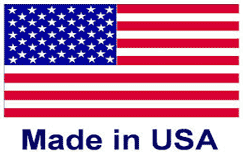Though it hasn't much showed up in the data yet, there is of course still great interest in "Made in the USA," and continued anecdotal stories of progress in that direction, such as the July announcement from Taiwanese contract manufacturing giant Foxconn that it would build a massive flat panel display factory on Wisconsin that will eventually employ thousands.
Supply Chain Digest Says... |
 |
| Some states, notably California, have defined made in USA very strictly, sometimes leaving manufacturers subject to expensive lawsuits. |
 |
What do you say? |
| Click here to send us your comments |
 |
| Click here to see reader feedback |
|
|
And US manufacturing overall is exhibiting strength - the US purchasing managers index (PMI) from the Institute for Supply Management for September released earlier this week came in at a very robust level of 60.8, far above the 50 mark that separates manufacturing expansion from contraction, and the highest monthly score in a whopping 13 years.
With that backdrop, a couple of US congresspersons have jumped on the bandwagon, introducing legislation that if passed would bring some clarity to Made in USA labeling and give consumers more data to use in buying decisions.
As first reported las week on the buckslocalnews.com web site (which covers news in Bucks County, PA), Congressman Brian Fitzpatrick (R-PA) and Congresswoman Kyrsten Sinema (D-AZ) introduced The Made in America Act of 2017 [H.R. 3850], which would create a voluntary, standardized labeling program that would allow consumers to easily identify the extent to which products are American-made.
"American manufacturing means American jobs. People in my community understand that when they buy American they're not only buying quality products, they're helping American businesses - and American workers - in their neighborhoods and across the country," said Fitzpatrick. "The Made in America Act would connect American consumers to American manufacturers like never before by creating a definitive, standardized definition of American-made goods. I'm grateful for the support of Congresswoman Sinema in working to advance this bipartisan priority."
"Helping American consumers purchase American-made products is a win-win," said Sinema. "It's simple: buying American-made products supports American jobs and gives America consumers what they want."
The Made in America Act would encourage and educate consumers on buying "Made in America" products by creating an "America Star Program" similar to the successful Energy Star and USDA Certified Organic programs. The new voluntary program would encourage manufacturers to meet certain domestic manufacturing benchmarks, showing the percentage of the product made in the USA, while providing consumers an easy way to identify American made products. The Federal Trade Commission would be responsible for overseeing the development of the guidelines, labeling and enforcement. The legislation has been referred to the House Committee on Energy and Commerce. No equivalent bill in the Senate has yet been proposed.
(Article Continued Below)
|
CATEGORY SPONSOR: SOFTEON |
|
|
| |
|
|
 Not only might this help educate US consumers about products made in the US, it may also serve to standardize the definition of what Made in USA really is, something lacking at the moment and which leave manufacturers subject to the vagaries of different state laws. Not only might this help educate US consumers about products made in the US, it may also serve to standardize the definition of what Made in USA really is, something lacking at the moment and which leave manufacturers subject to the vagaries of different state laws.
Some states, notably California, have defined made in USA very strictly, sometimes leaving manufacturers subject to expensive lawsuits for labeling a product as made in the US when a small part or two out of the total assembly was made offshore - in some cases because the component was not available from any US supplier. (See In Era of Reshoring, Just What Qualifies to be Labeled "Made in America?")
The clarity around labeling and Made in America claims would certainly be welcome, but whether enhanced labeling will drive increased consumer purchases of US made goods remains to be seen. Still, the "certified" emblem proposed in the bill certainly could have an impact.
Do we need better clarity on what can be called Made in USA? Would this labeling ipact consumer behavior? Let us know your thoughts at the Feedback section below.
Your Comments/Feedback
|